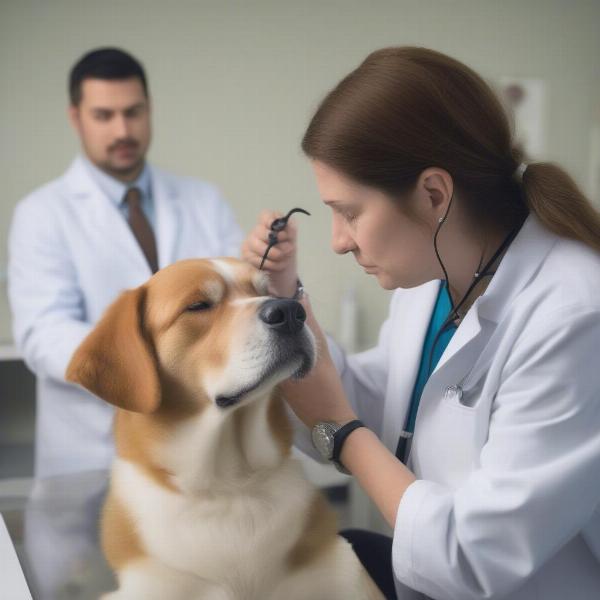Vestibular Peripheral Cytopathies (VPCs) in dogs can be a frightening experience for owners. Seeing your normally playful companion suddenly disoriented, tilting their head, and struggling to walk can be incredibly distressing. This article aims to provide a comprehensive understanding of VPCs in dogs, covering symptoms, diagnosis, treatment, and management to help you navigate this challenging condition.
Dogs experiencing VPCs often exhibit a distinct set of symptoms related to balance and coordination. These symptoms can appear suddenly and be quite dramatic, often mimicking a stroke. The most common signs include a head tilt, often quite severe, circling in one direction, and a loss of balance leading to stumbling and falling. Nausea, vomiting, and rapid eye movements (nystagmus) are also frequently observed.
Recognizing the Signs of VPCs in Dogs
How can you tell if your dog might be suffering from VPCs? While a definitive diagnosis requires veterinary expertise, being aware of the key symptoms can help you seek timely medical attention. Look out for a sudden onset of head tilt, difficulty walking or standing, circling, and unusual eye movements. If you observe any of these signs, especially if they appear abruptly, it’s crucial to consult a veterinarian immediately.
The sudden appearance of VPC symptoms often alarms owners, who understandably worry about severe neurological problems. While alarming, VPCs are often treatable and manageable. A prompt veterinary diagnosis is essential to rule out other conditions with similar symptoms, such as brain tumors, inner ear infections, or strokes.
Diagnosing and Treating VPCs: What to Expect
Your veterinarian will likely perform a thorough physical examination, including neurological tests, to assess your dog’s balance, coordination, and reflexes. Blood tests and imaging studies, such as MRI or CT scans, might be necessary to exclude other potential causes of the symptoms. The diagnosis of VPCs is often based on the characteristic clinical signs and ruling out other neurological disorders.
 Veterinarian Examining a Dog for VPCs
Veterinarian Examining a Dog for VPCs
Treatment for VPCs primarily focuses on supportive care and managing the symptoms. In many cases, the condition resolves spontaneously over time. Medications to control nausea and vomiting can be prescribed to alleviate discomfort. Physical therapy, including balance exercises, can help improve coordination and recovery.
Living with VPCs: Long-Term Management and Care
While most dogs recover fully from VPCs, some may experience residual effects, such as a persistent head tilt. Long-term management involves providing a safe and supportive environment for your dog. Adjusting their living space to minimize obstacles and potential hazards can prevent falls and injuries.
“VPCs can be disconcerting, but with proper veterinary care, most dogs recover well and regain their quality of life,” says Dr. Amelia Shepherd, a veterinary neurologist with over 15 years of experience. “Early diagnosis and supportive care are key to successful management.”
Frequently Asked Questions About VPCs in Dogs
- What causes VPCs in dogs? The exact cause is often unknown, but it’s thought to be related to inflammation or damage to the inner ear or vestibular nerve.
- Are VPCs painful for dogs? While not directly painful, the associated nausea and disorientation can cause discomfort.
- How long does it take for a dog to recover from VPCs? Recovery time varies, but most dogs show improvement within a few weeks, with complete recovery taking several months.
- Can VPCs recur in dogs? Recurrence is possible, although less common.
- Are certain breeds more prone to VPCs? No specific breed predilection has been identified.
- What is the prognosis for dogs with VPCs? The prognosis is generally good, with most dogs making a full recovery.
- What should I do if I suspect my dog has VPCs? Contact your veterinarian immediately for diagnosis and treatment.
ILM Dog is your trusted source for expert advice on all aspects of dog care and well-being. From breed selection to health, training, and nutrition, we provide comprehensive and practical information to help you provide the best possible care for your canine companion. Our team of experienced writers and veterinary professionals are dedicated to offering valuable resources and guidance to dog owners worldwide. For more helpful tips and insights, explore our website at ILM Dog. Contact us today for personalized support via email at [email protected] or by phone at +44 20-3965-8624.